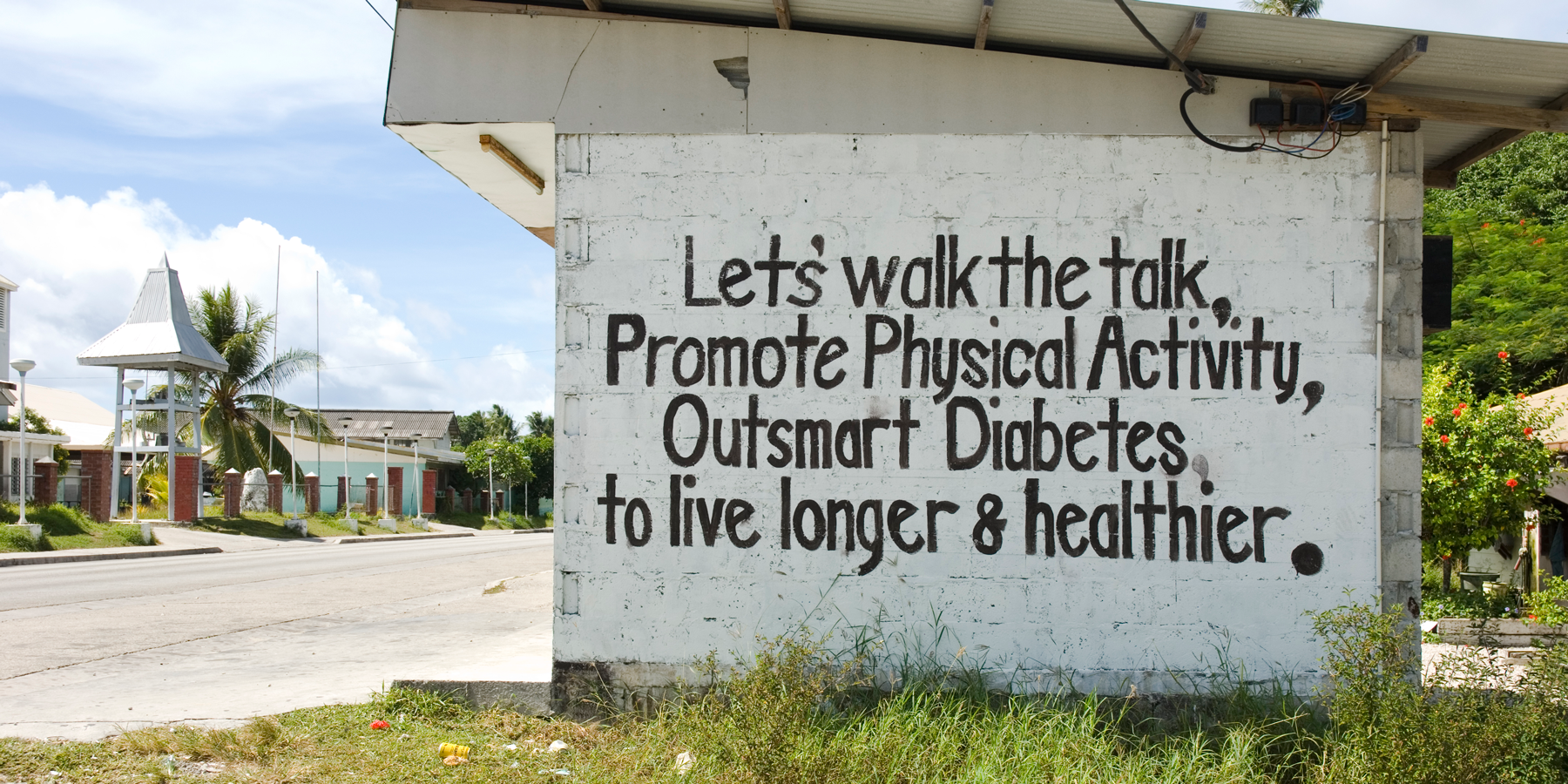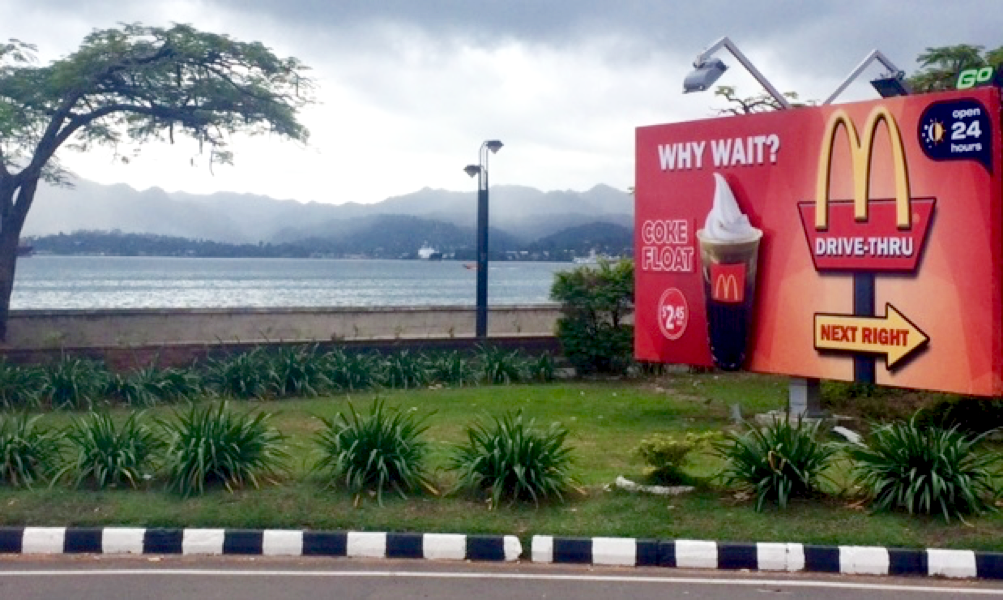Pacific Islands take the bull by the horns to combat the NCDs crisis
08th August 2016

08th August 2016
Take any NCD statistic, look at the highest figure and chances are that it is from a Pacific Island country.
NCDs are by far the leading cause of preventable death in the Pacific Islands, and two thirds of Pacific islanders who die from an NCD, die before the age of 70. Mortality from NCDs is three times higher than in neighbouring Australia and New Zealand. Cardiovascular disease alone accounts for between 29 and 38 percent of all causes of death combined. Diabetes prevalence in the general population is off the charts. Close to 40 percent of Micronesians and Palauans, nearly a third of Marshall Islanders and a quarter of I-Kiribati people suffer from this chronic affliction and its cohort of debilitating complications. Delayed presentation to health facilities which are inadequately tooled and staffed, leads to a staggering number of lower limbs amputations and blindness. Cancers too are on the rise and treatment options are very limited. They affect women more than twice than men. In Fiji, which has a population under of 900,000, cervix, breast and uterus cancers combined represent 42 percent of the total cancer burden. Breast cancer alone represents 20 percent of this burden and there are only three mammography units in the country. Mortality data is sketchy and believed to range from 40 to 70 percent.
Female obesity prevalence is routinely above 50 percent across the region, reaching 70 percent in Tonga. Physical activity is extremely low as is vegetable and fruit consumption. A deadly mix of colonial heritage, aid, remittances, bad policies and trade dependence have driven a rapid shift from a subsistence lifestyle in pristine environments to an environment that encourages the worst of ‘western diets’ and influences. Binge drinking is normative while male smoking prevalence ranges from 20 percent in Fiji to over 70 percent in Kiribati and is increasing among women and girls reaching as high as 62 percent in Palau and 57 percent in Northern Marianas Islands. From Saipan to Suva, greasy fish and chips, dripping-fried chicken and ice cream joints line the streets of tropical capitals where a growing number of disenfranchised rural youth congregate in search of waged employment. Fresh university graduates now dream of menial jobs in the metropolitan cities of Sydney, Auckland, Honolulu or Los Angeles while mango trees are felled in squares to erect billboards displaying yet another colourful advert promising happiness in a bottle. In the distance, fertile volcanic land often lies idle in the foot hills while foreign fishing fleets of long liners and purse seiners drain the surrounding seas of their last tuna until seabed mining takes the relay to keep afloat sluggish island economies. This depiction may seem crude, partial and indeed far from the stereotyped ‘island paradise’ found in travel agency brochures but make no mistake, globalisation is here. And it is here to stay.

Nearly all countries have had multisectoral NCD strategies in place for years. Leaders declared NCDs ‘a development crisis’ back in 2011, before the Political Declaration of the UN General Assembly. As such, they have greatly contributed to put NCDs in the 2030 Agenda for Sustainable Development. Political commitment is high and constantly renewed. The WHO Framework Convention on Tobacco Control was adopted by all countries and is gradually enforced. Taxes on sugar sweetened beverages and alcohol are being increased while those on fresh produce and sports equipment have been dropped in some instances. Nearly everyone in the health sector is familiar with the WHO ‘best buys’; a set of low cost, highly effective interventions that target the population as a whole. These urge countries, for example, to increase excise taxes on tobacco and alcohol, implement salt reduction strategies, replace trans-fats, legislate for smoke-free places, provide health information and warnings, and raise overall public awareness. Unfortunately, any significant dent or bend in the curve, both figuratively or literally, so far remains elusive. Nonetheless, the resolve is strong and the mood is more combative than fatalistic, no matter how intractable the problems may appear.
From June 22nd - 24th 2016, a high level NCD summit was held in the tiny Island Kingdom of Tonga themed ‘Translating Global and Regional Commitments into Local Action’. The event was attended by over 140 delegates from around the region, key regional donors and development partners. It was the latest in a series of ‘ringing the alarm bell’ type of gathering over the past few years. The event was an opportunity to present a case for more urgent and stronger action to address this crisis. It was also about reviewing how these countries are responding and can accelerate progress as much galvanising regional collaboration to implement good practices to address NCDs.
"...in Tonga, I am pleased to state that we have put in significant efforts to ensure that NCDs is kept very much at the forefront of everyone’s agenda, NCDs have been specified as among the government’s priority areas for at least the past 15 years.” His Majesty the King of Tonga, Tupou VI
In his opening address, His Majesty the King of Tonga, Tupou VI, urged once again the importance of a whole-of-government and whole-of-society approach to NCDs. The king’s address was followed by UNDP Administrator Ms Helen Clark’s keynote speech in which she highlighted the importance of strong leadership, the need to put adequate structures in place to coordinate sectors and pool resources as well as to empower communities and guard against industry interference in policy-making.
During the three days, delegates reviewed implementation of national policies, discussed results, exchanged ideas and some ‘discovered’ alarming trends such as the growing problem of tuberculosis-diabetes comorbidity (two conditions occurring at the same time and mutually worsening the outcome). In that context diabetes was dubbed ‘the HIV of the Pacific’. Delegates committed themselves to ‘urgent and stronger action’, agreed on ‘setting firm timelines to meet quantified and measurable targets’ such as meeting or exceeding 70 percent excise tax on tobacco to help achieve the ambitious goal of a Tobacco Free Pacific Goal by 2025.
The Health Ministers and senior officials from the 23 countries and territories also agreed to strengthen data collection and health information systems. They stressed the importance of fit-for-purpose governance mechanisms for multiple sector or branches of government to collaborate better, highlighted partnerships with the civil society and insisted on people-centered responses.
"Once priorities for action are identified, they have to be financed. Compared to the scale and depth of the misery which NCDs cause, responses to them are still chronically underfunded." Ms Helen Clark, Administrator of the United Nations Development Programme
Following a session on financing which UNDP co-led with the World Bank, delegates realised that the economic burden of NCDs -which is already significant- is projected to reach 12 percent of GDP on average by 2040. This is four times the global average. Alas the response to the NCD crisis in the Pacific Islands remains disproportionately underfunded. When it comes to financing, these countries face the following challenge: invest now or pay more later. Their options, however, are limited. On one hand the demand for health services is growing at a rate that is 20 percent higher than overall economic growth. On the other hand these countries already have high levels of health spending relative to income.
Development assistance for health is nonetheless generous. Regional donors such as Australia, New Zealand, France or the USA underwrite many health budgets in the region. This aid ranges from 8-9 percent in Fiji to 60 percent in the Federated States of Micronesia. But however welcome, this assistance is not necessarily well aligned with country priorities and disease profile. For example, in the past decade, more than twice the level of external funding addressed HIV which represents less than one percent of the disease burden as compared to the allocation for NCDs, representing over 70 percent of the disease burden. This is not to say HIV responses are over-financed, but the conclusion that NCD responses are underfinanced is inescapable. At the summit, delegates agreed to explore greater synergies between funding sources, notably the opportunities to better leverage the Global Fund to fight AIDS, Tuberculosis and Malaria, through the recently approved co-morbidity framework. They also heard about innovative mechanisms such as intersectoral co-financing, being pioneered by UNDP in sub-Saharan Africa.
Other highlights included the experiences of bold steps such as on taxation of sugar-sweetened beverages and other health-harming products. Some countries immediately took action. Samoa announced a 90 percent tax increase on tobacco at the meeting. The day after the event, Fiji unveiled plans to increase by a further 15 percent tobacco and alcohol taxes and slap a 20 cents per litre additional tax on sugar sweetened beverages as part of its national budget submission.
Calls were also made to ensure consistent access to affordable and cost-effective pharmaceuticals and diagnostics which weigh heavily in health budgets. Delegates in that context underscored that more work needed to be done for a more balanced intersection of trade liberalisation and economic integration objectives with those of population health, an area UNDP has been pioneering in the region with sister UN agencies and the Pacific Community.
“We need the added muscle of all sectors of society working together, including funding support and commitment from governments and development partners,” Dr Tukuitonga, Pacific Community Director-General
While for some, the event fell short of recognising the fundamental and transformational shifts that are needed to begin to reverse the NCD trends and lamented the non-attendance of ministers of finance or other sectors than health, all agreed unequivocally that the Pacific not only can but is actually leading the way to prevent yet another generation to be lost prematurely to preventable diseases of our own collective making.
"The NCD crisis is surmountable and reversible. What we have to gain are not just longer lives and more sustainable economies. It is the enjoyment and pride we take in nurturing new generations to lead healthier lives and in celebrating unique cultures and environments." Ms Helen Clark, Administrator UNDP
Ferdinand Strobel (@Fefeferdinand), is Health and Development Advisor for UNDP - Pacific Office in Fiji (@UNDP_Pacific). He has worked for 16 years across 3 continents in a range of fields, from humanitarian response to long term development with a focus on health from a governance perspective. His current role sees him integral to partnership development and improving Pacfic regional and national commitments for health and trade policy coherence in the context of NCD epidemic.